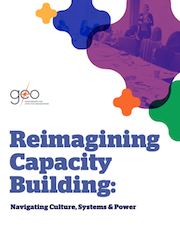Site Search
- resource provided by the Forum Network Knowledgebase.
Search Tip: Search with " " to find exact matches.
Eastside High School in Paterson sits in the middle of a struggling neighborhood, in a city where 25% of the residents are living below the poverty line, according to the 2020 U.S. Census.
Paterson’s poverty rate is more than twice the state average of 10%, which makes the school, built in 1926, a refuge — and now a resource.
On Thursday, Montclair State University president Jonathan Koppell came to Eastside with a $1 million grant and a vision: to make the school into a community hub, offering free meals, health care, and mental health counseling, not just to the 2,000 students, but to their families as well.
The initiative is called One Square Mile, and it is being seeded with a $1 million grant from the Geraldine R. Dodge Foundation. The program was developed by Koppell during his tenure as Dean of the Watts College of Public Service and Community Solutions at Arizona State University, which worked with the Phoenix-area community of Maryvale to address poverty.
The Philadelphia 76ers, looking to make an even greater impact in the community in which they train, are making a donation of $120,000 to the Camden County Police Department, the largest private donation ever.
The donation, made through the Sixers Youth Foundation, will fund youth fitness initiatives throughout Camden city, as it will be used to enhance and expand several programs in the Camden County Police Department’s Village Initiative, including the open gym and resource nights, Camden officials said.
Camden County Commissioner Director Louis Cappelli was floored by the gesture — but noted it follows the effort the team has been making for some time.
“From the start, this agency has been focused on community engagement and facilitating a lifelong dialogue in order to become part of the fabric of the city,” he said. “This investment by the Sixers underscores the importance of the work we do with our residents on daily basis with a focus on our youth in Camden.
“I want to thank them for walking the walk and being an important part of our village here in Camden County.”
Novartis benchmarked Employee Crisis Programs, and asked fellow corporate funders via the corporate funders listserve to answer the questions below.
- If you have an Employee Crisis Program, what is the name
- Do you manage the program internally or thru a 3rd party? If you use a 3rd party, can you share their name/website and any good/bad experiences.
- Do you only support disasters or other hardships as well?
- What is the average percentage of your employees that apply for aid?
- What is your minimum and maximum funding?
- What is the average amount of aid?
- Do you provide aid directly to the employee and/or vendors?
- Do you allow employees to donate to your fund? If so, how do you promote awareness and what is the employee donation participation rate? Do you match these donations?
- Where does the program reside (CSR, Foundation, HR)?
- Please share guidelines and applications, if possible.
- Please share any other insights.
With the recent passage of the federal budget bill that slashed Medicaid and food assistance for millions of Americans while directing $170 billion to border militarization and the surveillance, detention, and deportation of immigrants, it is clear that private industry stands to profit while tearing families and communities apart. Indeed, between Trump’s election in November 2024 and April of this year, the stock prices of the nation’s two largest private detention facility operators, GEO Group and CoreCivic, soared 94% and 62% respectively – a pattern that the Brennan Center for Justice notes followed Trump’s first election. Indeed, in the immediate aftermath of the budget bill’s signing, both companies saw a further 3% increase in stock value.
With billions in philanthropic assets invested in financial markets, advocates have long called for divestment from private detention facilities and the broader prison-industrial complex. These efforts exist as part of the larger movement for divestment from the range of extractive industries that harm the very communities that foundations seek to support through their grantmaking. Numerous funders have taken up the challenge of revisiting their investment strategies to better align with their missions, with some also pursuing restorative grantmaking practices. In this session we’ll engage in a discussion with several of those funders, as well as an impact investment firm committed to advancing a regenerative economy.
This session will be an excellent opportunity for staff on both the investment and grantmaking sides of the house to learn first-hand what it looks like to operationalize divestment and impact investing strategies, so invite your colleagues and bring your questions!
Speakers
Hans How, Integrated Capital Officer, Restorative Economies Fund, Kataly Foundation
Alex Saingchin, Co-Founder & President, Just Futures
Rochelle Witharana, Chief Financial and Investment Officer, California Wellness
Moderator
Rachel Fagiano, Funders for Justice
Cost: Free

